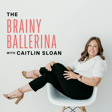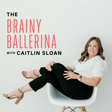
72. Behind the Curtain with Lauren Ostrander McArdle: The Psychology of Dance
In this inspiring episode of The Brainy Ballerina Podcast, I’m joined by former professional ballerina and performance psychology expert Lauren Ostrander McArdle. Lauren danced with companies including the National Ballet of Canada and as a soloist with Sarasota Ballet and now holds a Master’s Degree in Sport and Performance Psychology. She is the founder of Behind the Curtain, a platform dedicated to equipping dancers with the mental tools they need to thrive on and off the stage.
Lauren shares her unique dance journey, from her reluctant early ballet days, to leaving home at just 14 to pursue serious training, to eventually securing professional contracts. We dive into the highs and lows of a dance career, from dream contracts and devastating injuries to resilience, mental strength, and redefining success beyond the stage. Lauren shares her powerful comeback story, insights into ballet culture, and practical advice for dancers navigating both the physical and mental demands of the art form.
Key Points in this Episode:
- Why Lauren didn’t love ballet at first, and what changed her mind at age 10.
- The pivotal role of teachers and environment in shaping a dancer’s path.
- The challenges of balancing independence, schooling, and training as a teen dancer.
- Lauren’s transition from student to professional and how she navigated auditions.
- Lauren’s devastating early-career injury and the long road back to dancing.
- The pivotal moment she returned to the stage with the National Ballet of Canada.
- Behind-the-scenes stories of being thrown onstage last minute at San Francisco Ballet.
- The mental challenges dancers face especially fear of failure, comparison, and external validation.
- Why confidence is a trainable skill and how to start building it today.
The unique cultural pressures of ballet compared to traditional sports. - How teachers and mentors can balance high expectations with high support.
Connect with Lauren:
INSTAGRAM: instagram.com/behindthecurtain.spp
PERSISTENCEPSYCH IG: instagram.com/Persistencepsych
PIVOT DANCER IG: instagram.com/pivotdancer
Links and Resources:
Get 10% off registration for Étoile Dance Competition with code BRAINY10
Get your copy of The Ultimate Audition Guide
Let’s connect!
My WEBSITE: thebrainyballerina.com
INSTAGRAM: instagram.com/thebrainyballerina
1-1 CAREER MENTORING: book your complimentary career call
Questions/comments? Email me at caitlin@thebrainyballerina.com

